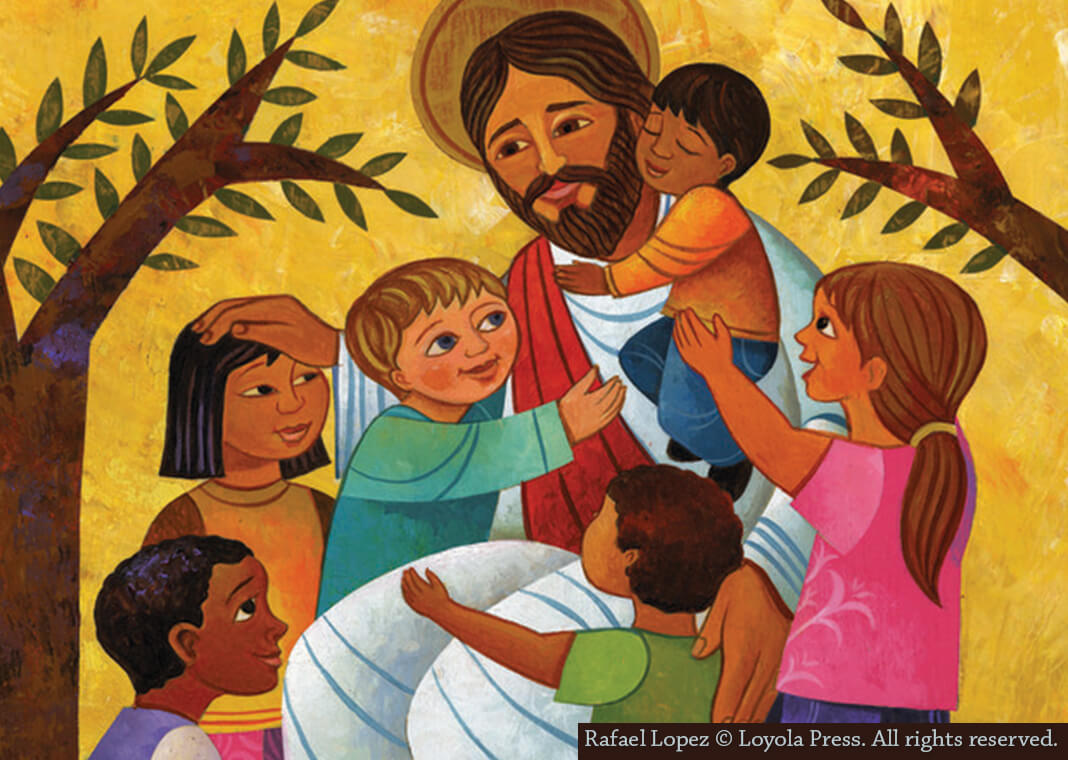 This story is inspired by Matthew 18:1–5.
This story is inspired by Matthew 18:1–5.
We had just traveled from Galilee and stopped near the far side of the Jordan River. Bodies pressed close together and the dry, warm air caused me to be uncomfortable. I think it was ego that caused my friend to ask Jesus who would be greatest in heaven. The crowd waited for Jesus to answer, although I suspect many pressed closer because they hoped to witness some miracle.
As Jesus smiled at the questioner, some parents started pushing their children through for a blessing. While some disciples tried to hold them back, Jesus did the opposite. He called one of the little ones to the center of the circle.
Coming forward, she looked at her sandals shyly and drew circles in the dirt with her feet. Jesus looked at her with love and said if we wanted to be great in his reign, we needed to be like children. He invited us to observe the child.
Immediately, I noticed several things. She wasn’t here alone. Her protective parents stood nearby, ready to come to her if needed. It made me realize that Jesus calls us to support others and that he was forming a kind of family with his followers.
I saw dandelions stuck in the girl’s pocket as if they were valuable treasures. She appreciated little things in nature, things we adults overlook. Everything has the power to evoke wonder in children.
In fact, at that moment, the little girl stooped to touch an insect wobbling by. She forgot about the people watching her. Curiosity gave her singular focus. I bet she worries about nothing, I thought. She hasn’t learned hypocrisy, sarcasm, or contempt. She is honest and innocent.
Jesus looked right into my eyes and asked me to voice my thoughts.
“Well,” I said, a bit taken aback. “This little girl is dependent, just as you taught us to pray and be dependent on our Father. She must ask permission from adults to do almost anything. She doesn’t crave or desire great power. And she is part of a family, just as we are part of a community. We won’t succeed if we try to go it alone.”
Jesus grinned and turned to others to add what they observed.
“I bet she is obedient,” chimed in another disciple. “She may not understand the reasons why she can’t eat certain things or why she needs to go to sleep when told. But she obeys authority, just as you, Jesus, ask us to obey you. And we won’t always understand God’s reasons for allowing us to suffer.”
Jesus nodded.
“She is without guile,” a woman said. “She is ready to trust. She expects good from others.” A murmur of agreement traveled across the group.
At that moment, the little girl walked over to Jesus, reached into her pocket, and gave him her precious dandelion.
“Children are generous and freely give love,” a disciple added, “and for that reason they readily forgive.”
I thought about that. I’d never known a little one to hold a grudge. Children assume people mean well.
“Children are aware that they don’t know everything,” a man said. “They ask questions and express their thoughts freely.”
“Awe,” someone said. “Little ones see beauty, like reflected rainbows, when adults see only muddy puddles. God wants us to express awe, praise, and gratitude for creation.”
“Children know how to run to a parent for safety, comfort, or reassurance. That’s how we need to approach our Father,” another said.
Jesus lifted his hand, and I knew we’d be moving on. He called the little children over, and they ran to him, hugging his legs.
“I love you!” said the girl who had given her dandelion.
And as Jesus blessed her, he said, “I love you too. And I always will.”

Thanks. Loretta has offered us interesting food for thought and action. Curiosity, honesty, and simplicity are the strengths of children. Hypocrisy, sarcasm, or contempt are the weaknesses of the adults. Growing-up is indeed a mighty challenge.
Loretta, I love your stories. They really help me to place myself in the scripture.
Thank you.
Yes, but children are also stubborn, opinionated, noisy, scared, lonely and afraid. Until adults change them, they are honest about what they’re feeling. But you may have to go way over in their corner, and wait a long time, to get them to talk to you. They know they need help. And they can easily get caught up in awe and wonder. Those two things, I think, are why Jesus says we need to be like them. The rest is commentary
Loretta, you have an incredible gift. Thank you for sharing these insights.